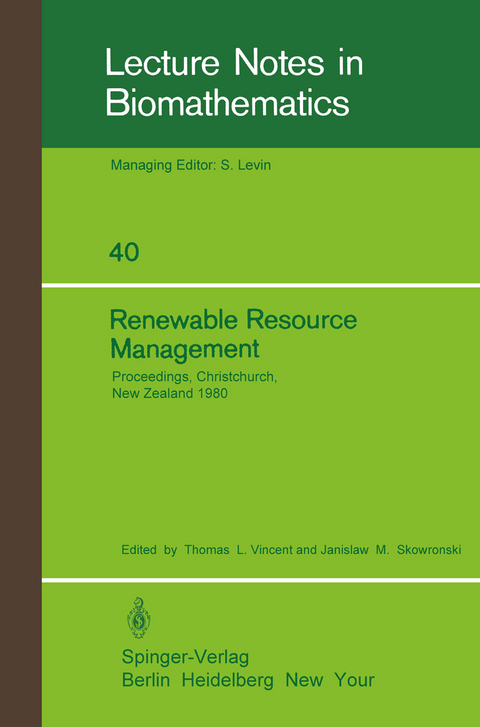
Renewable Resource Management
Springer Berlin (Verlag)
978-3-540-10566-4 (ISBN)
Thomas L. Vincent is Professor Emeritus with the Aerospace and Mechanical Engineering at the University of Arizona. His main research interests are in the area of Nonlinear Control System Design, Optimal Control and Game Theory, and Evolution and Adaptation of Biological Systems. He has numerous publications and books.
Mathematical Models and Resource Management.- More Realistic Fishery Models: Cycles Collapse and Optimal Policy.- Age-Structure and Stability in Multiple-Age Spawning Populations.- Optimal Management of Optimal Foragers.- Modelling and Management of Fish Populations with High and Low Fecundities.- Adaptive Identification of Models Stabilizing under Uncertainty.- Computational Difficulties in the Identification and Optimization of Control Systems.- Economic Models of Fishery Management.- Vulnerability of a Prey-Predator Model under Harvesting.- Nonvulnerability of Two Species Interactions.- Estimating Controllability Boundaries for Uncertain Systems.- Estimating the Effect of Krill Harvesting on the Southern Ocean Ecosystem.- Appraisal of the Commercial Potential of the New Zealand Deepwater Fishery.- Subinjurious Maintenance Strategies for Optimal Control of Nematodes.- A Plant-Water Model with Implications for the Management of Water Catchments.- Mathematical Modelling of the Transport and Loss of Leachable Plant Nutrients in Field Soils.
| Erscheint lt. Verlag | 1.4.1981 |
|---|---|
| Reihe/Serie | Lecture Notes in Biomathematics |
| Zusatzinfo | XII, 236 p. |
| Verlagsort | Berlin |
| Sprache | englisch |
| Maße | 155 x 235 mm |
| Gewicht | 420 g |
| Themenwelt | Informatik ► Weitere Themen ► Bioinformatik |
| Mathematik / Informatik ► Mathematik ► Angewandte Mathematik | |
| Naturwissenschaften ► Biologie ► Ökologie / Naturschutz | |
| Technik ► Umwelttechnik / Biotechnologie | |
| Wirtschaft | |
| Schlagworte | air pollution and air quality • Biologisch-mathematisches Modell • Ecology • ecosystem • Ernteertrag • Management • Naturgüter • Seefischerei • Soil • Water Quality and Water Pollution |
| ISBN-10 | 3-540-10566-2 / 3540105662 |
| ISBN-13 | 978-3-540-10566-4 / 9783540105664 |
| Zustand | Neuware |
| Informationen gemäß Produktsicherheitsverordnung (GPSR) | |
| Haben Sie eine Frage zum Produkt? |
aus dem Bereich


